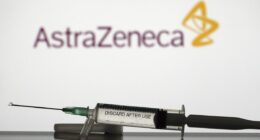
The U.S. Food and Drug Administration (FDA) authorized Pfizer-BioNTech COVID-19 boosters for children ages five to 11 Tuesday. The administration said in a statement that kids within that age range can get a booster five months after completion of the Pfizer-BioNTech primary vaccination series. “While it has largely been the case that COVID-19 tends to be less severe in children than adults, the omicron wave has seen more kids getting sick with the disease and being hospitalized, and children may also experience longer term effects, even following initially mild disease,” FDA Commissioner Robert M. Califf, MD, said in the statement.
Getting vaccinated and boosted is the best protection we have against severe COVID-19, which can lead to hospitalization or death. “Children are not bulletproof against COVID-19,” Thomas Russo, MD, infectious disease expert at the Jacobs School of Medicine and Biomedical Sciences, tells SELF.
Getting a booster dose could also help prevent potential long-term effects from COVID-19 (known as long COVID), Kimberly Giuliano, MD, a pediatrician at Cleveland Clinic, tells SELF. She says it’s helpful to think of the booster as “another layer of protection” for children who have received the primary vaccination series.
In addition to keeping children safe from severe COVID-19, the booster dose could serve the community as a whole. “Getting the COVID-19 [booster] protects children and those around them—particularly those like grandparents or older relatives who may be more vulnerable to COVID-19,” Dr. Giuliano says. “The more people who are vaccinated, including children, the better chance we will have of slowing the spread of COVID-19.”
The booster dose is especially important for children who may be spending significant amounts of time with unvaccinated individuals, such as in classrooms or sporting events. “In areas with lower vaccination rates, the booster is even more important as the spread of disease will likely be greater,” Dr. Giuliano adds.
READ RELATED: CDC reports NINTH presumptive case of monkeypox in Virginia
That said, a booster dose won’t necessarily prevent infection in every single case, as we’ve seen over the past few months since omicron emerged, says Dr. Russo. If parents are unsure about whether they should vaccinate their children, they should turn to their health-care providers, experts say. “It’s understandable that parents may have questions or concerns about COVID-19 vaccination and boosting for their children,” Dr. Giuliano says. Pediatricians—or other trusted providers—can help parents understand why vaccination is crucial for children (and those around them). “It’s critical for parents to remember the benefit-risk ratio heavily favors vaccination and subsequent boosting when appropriate,” Dr. Russo says.
Part of the reason the booster dose was authorized, Dr. Russo adds, comes down to what scientists and doctors are currently seeing: a large number of people infected with omicron even after vaccination and a booster dose. “We are seeing another increase in COVID-19 cases across the country,” Dr. Giuliano adds.
On Tuesday, the Biden administration announced that families can now order a third round of free at-home tests from this website. Also this week, the FDA authorized an at-home sample kit that detects COVID-19, respiratory syncytial virus (RSV), or the two most common strains of influenza (A and B). The test can be purchased online or in-store without a prescription; people then send their sample to the maker of the test kits, Labcorp, to be analyzed. Easily determining which (if any) virus they’re suffering from will help people follow the necessary safety protocols. “This will enable consumers to more easily determine whether they may be infected with COVID-19, flu, or RSV, which can aid in determining if self-isolation (quarantine) is appropriate,” the FDA statement said.
Related:
Source: SELF










